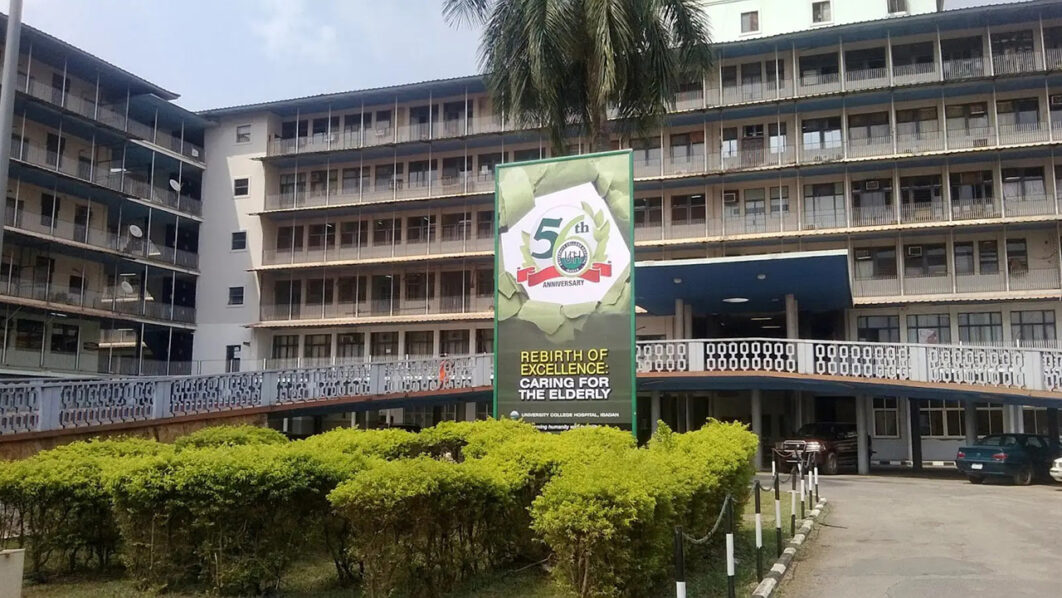
• Wards in pitch darkness, patients, relatives groan
• Many depend on rechargeable lamps, solar-powered fans
• Management denies self-help measures, service decline
The public power crisis rocking the University Teaching Hospital (UCH), Ibadan, is taking an embarrassing toll on the flagship tertiary hospital and the public whose wellbeing depends on it.
The sprawling federal government-owned health facility has been in blackout for 107 days and is only powered by generating sets, inverters, rechargeable lamps, and solar-powered fans – as provided by the management, and sometimes by desperate care seekers.
While the management denied the patients’ self-help measures, the larger part of the facility is in chaos and near-inhabitable for genuine care services that the flagship public facility was once known for.
Approaching the facility erstwhile known for its bustling and bubbling environment, it was shocking to observe that the UCH near deserted. Right from the main entrance, it was glaring that UCH had become a shadow of its old self, no thanks to the disconnection of its power supply by Ibadan Electricity Distribution Company (IBEDC) on October 26, 2024, over an outstanding debt of N495 million.
The Chairman of the Joint Health Sector Unions (JOHESU) at the University College Hospital (UCH), Ibadan, Mr Oladayo Olabampe, had in November, disclosed that the hospital was spending about N80 million monthly on electricity bills despite its worsening financial situation.
According to him, the hospital’s inability to sustain the payment led to the disconnection of supply from the facility by the Ibadan Electricity Distribution Company (IBEDC) on October 26.
At the wards, departments and units visited by The Guardian, very few patients were seen compared to the routine heavy traffic. Many of the departments were in grim darkness, with relatives and some patients getting fresh air in the open space.
Findings show that some patients, who could not bear it and can afford the bill, have resorted to patronising private and state-owned medical facilities.
Miss Rebecca Odeyemi, whose parent recently felt sick, said people were afraid of going to UCH for the fear of deterioration of their medical conditions.
According to Odeyemi: “UCH has become the ghost of its former self. Nobody wants to come to the hospital again,” she said. Those who keep faith with the facility for medical care are also doing so at extra cost and effort.
A patient said: “To get some tests done now, the hospital can put on a generating set for like 30 minutes and then switch it off. Sometimes, we would be asked to go outside the hospital premises to get our tests done. We were asked to go to Mokola for a urine test, which ought not to be so.
“The situation has never been this bad because I once put to bed here, and there was always power supply then. So, why all this?” A doctor in the institution told The Guardian that the power supply had gone off for several weeks. “The staff in my department are contributing money to buy fuel for the generator. We have been rationing the supply just to get by.”
A medical technician, Mustapha, said: “The hospital makes use of generating sets in some sections that are critical. For instance, they switch on the generators on Mondays, Wednesdays and Fridays from morning to night for the first, second and fourth floors. These are the areas where we have theatres. There are inverters at Theatre One and Two and on the second floor.
“Most of the wards have solar power for light only. Most laboratories make use of inverters and solar power. The Radiology Department, which comprises the X-ray, Ultrasound and CT scan units make use of generating sets. When the generating sets are on, they conduct tests.
“The CMD office and that of CMAC (Chairman, Medical Advisory Committee) have solar power.” Reports have it that the electricity crisis at the hospital reached an alarming point last month, with patients resorting to bringing their own generators, solar inverters, rechargeable lamps, and fans just to receive medical treatment.
However, the UCH management in a rejoinder, yesterday, refuted the claims that patients at the hospital were bringing their own generators to power the wards.
The Public Relations Officer of the hospital, Funmi Adetuyibi, said that the report was a malicious attempt to misrepresent the situation at UCH. She said those claims lacked credibility and were further undermined by the inclusion of images of “low capacity generators”, which the hospital does not operate.
UCH clarified that despite the recent disconnection of electricity by the Ibadan Electricity Distribution Company (IBEDC), the hospital had taken significant measures to address the power challenge.
“We remain committed to our core services; Clinical Services, Research, and Training,” the management said, adding that they had implemented a phased approach to provide sustainable electricity solutions, including the installation of solar inverters and diesel-powered generators in critical areas such as the wards, accident and emergency, labour wards, and theatres.
The extended blackout has sparked outrage and concern online with users demanding answers and many questioning the state of the nation’s healthcare infrastructure and the government’s ability to provide essential services.
In an attempt to address the crisis, the Oyo State Government’s Feedback and Resolutions account responded on X (formerly Twitter), saying: “Thank you for contacting us. The Oyo State Government is aware of the power supply challenges at the University College Hospital (UCH), Ibadan. While the hospital is managed by the federal government, we are working to connect UCH to the State’s Independent Power Plant (IPP) as a medium-term solution.”
Another X user and a patient safety advocate @Nigerian_Doctor, along with several others, called on the Ministry of Health and the media to intervene, pointing out that the blackout has now lasted nearly 100 days. “Patients have staged a riot on the wards. People are protesting. Yet, darkness persists. We urgently plead for your intervention, once again,” he wrote.
This ongoing power crisis at UCH underscores the extreme strain on Nigeria’s already fragile healthcare system. Power shortages are putting patients’ lives at risk and further exposing the failings of the country’s healthcare infrastructure, with no clear solution in sight.
Last November 2024, The Guardian reported a troubling development when patients and their families at UCH staged a protest over the prolonged power outage. The protest brought all hospital activities to a halt, stranding both patients seeking care and those attempting to leave.
The outage began when the IBEDC disconnected UCH’s power for over 17 days. This disruption severely impacted hospital operations, causing delays in surgeries and diagnostic test results. In a viral video, a protester claimed that patients were being unfairly charged for electricity and water services, which were unavailable during the blackout.
One anonymous protester expressed their frustration, saying, “People are in pain, and some are dying in the wards. No electricity, no light, and you sit there calling yourselves management. If there’s an issue, address it! Stop killing people here. What happened? What did we do? You don’t care about the lives of the patients.”
Although the federal government approved a 50 per cent subsidy on electricity for public hospitals in September 2024, the actual implementation and impact of this policy remain uncertain.
In the video, UCH management disclosed that the hospital is required to pay N80 million monthly under the “Band A” electricity tariff structure, which places a significant financial burden on the facility.






